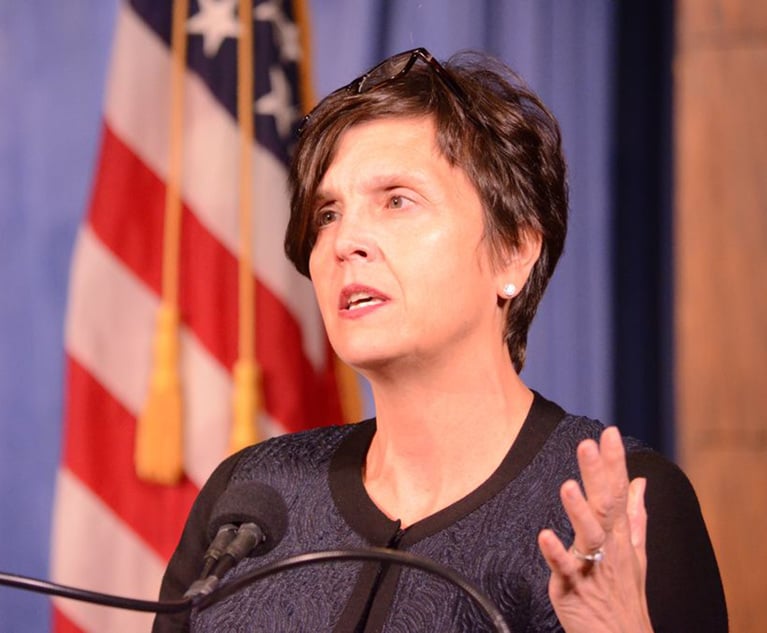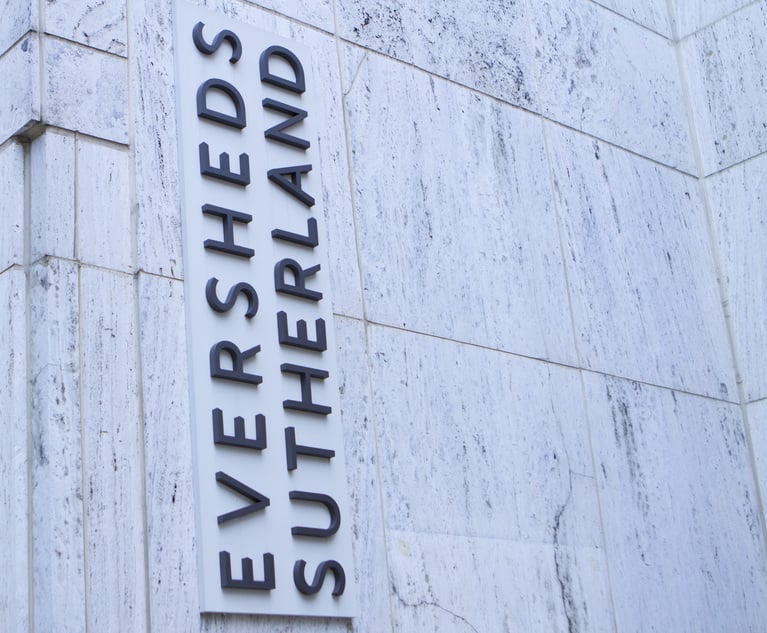Covington Team Accuses Russia of Crimes Against Humanity in Hague Court Hearing
Covington represented Ukraine in a three-hour hearing over Russia's military invasion. Russia did not attend the hearing.
March 07, 2022 at 03:13 PM
4 minute read
The original version of this story was published on Law.com International
 The Seat of the International Court of Justice in The Hague. (Credit: S-F/Shutterstock)
The Seat of the International Court of Justice in The Hague. (Credit: S-F/Shutterstock)
At a hearing before the Hague-based International Court of Justice, a three-lawyer Covington & Burling team accused Russia of using a seminal, post-war U.N. treaty as a legal window-dressing for its invasion of Ukraine.
At stake, they said, was not just Russia's invasion of Ukraine, but the future of one of the most-important human rights treaties adopted in the wake of the Second World War.
"The tragedy we are all watching in the streets of Kyiv, Kharkiv, Mariupol, Kherson, Volnovakha and so many other Ukrainian cities is precisely what our modern international legal system was designed to prevent," Harold Hongju Koh, the Yale law school professor who served as co-counsel, told the 15 judges on Monday. "This case has become much bigger than just Ukraine versus Russia. It has become a test of who will prevail—Russia or the post-war international legal order."
Ukraine brought the case before the Hague-based court last week, alleging that Russia had broken U.N. law by invading Ukraine and by using the 1948 U.N. treaty criminalizing genocide as justification for that military aggression.
The Covington team representing Ukraine consisted of the Washington, D.C.-based partners Marney Cheek and David Zionts and London-based partner Jonathan Gimblett. Cheek is co-chair of the firm's international arbitration practice. Koh, a legal adviser at the U.S. State Department during the Obama administration, and Paris-Nanterre University professor Jean-Marc Thouvenin served as co-counsel.
Zionts sought to establish what he described as the "factual context" behind Russia's allegations that Ukraine had committed genocide on Russian speakers in the eastern Donbass region of Ukraine since Russia's annexation of Crimea in 2014. Describing those claims as false and outrageous, he said: "Russia's claim is that a genocide has occurred under the noses of diligent UN factfinders, OSCE monitors and ICC prosecutors."
Cheek's role was to establish that the rights under the 70-year-old genocide convention that Ukraine sought to have protected by turning to the court were at the minimum plausible, which is sufficient for temporary measures to be applied in an anticipation of a later hearing on merits.
Pointing out that Ukraine had a right under the 1948 convention not to suffer war crimes and crimes against humanity as a result of Russia's "misuse and abuse" of the treaty, she said, "Ukraine's rights are at least plausible and grounded in a possible interpretation of the Convention, which is all that the court must find at this stage for provisional measures to be appropriate." She added that Russia had "abused and misused" its rights and duties under the genocide treaty as a "legal shield" for its unlawful invasion of Ukraine.
In his comments to the court, Gimblett established the Ukrainian population's urgent need of court protection and emphasized that Russia's military operations had triggered a military, humanitarian and environmental crisis of a scope not seen on the continent since 1945. He added that these humanitarian and environmental consequences satisfied the conditions of "irreparable harm and urgency" that must exist for the Hague court to order provisional measures.
Russia, which had been scheduled to argue its case in Tuesday, did not attend the hearing and sent the court a letter saying that it had decided not to participate in the oral proceedings.
The next step is for the Hague-based court, which is the court for resolving disputes between U.N. nations, to deliver its decision on the matter. A date for that decision has not yet been announced, but it is expected in the next few weeks.
Covington has represented Ukraine in proceedings against Russia before several courts in the past.
NOT FOR REPRINT
© 2025 ALM Global, LLC, All Rights Reserved. Request academic re-use from www.copyright.com. All other uses, submit a request to [email protected]. For more information visit Asset & Logo Licensing.
You Might Like
View All


Big Law Practice Leaders 'Bullish' That Second Trump Presidency Will Be Good for Business
3 minute readLaw Firms Mentioned
Trending Stories
- 1Uber Files RICO Suit Against Plaintiff-Side Firms Alleging Fraudulent Injury Claims
- 2The Law Firm Disrupted: Scrutinizing the Elephant More Than the Mouse
- 3Inherent Diminished Value Damages Unavailable to 3rd-Party Claimants, Court Says
- 4Pa. Defense Firm Sued by Client Over Ex-Eagles Player's $43.5M Med Mal Win
- 5Losses Mount at Morris Manning, but Departing Ex-Chair Stays Bullish About His Old Firm's Future
Who Got The Work
J. Brugh Lower of Gibbons has entered an appearance for industrial equipment supplier Devco Corporation in a pending trademark infringement lawsuit. The suit, accusing the defendant of selling knock-off Graco products, was filed Dec. 18 in New Jersey District Court by Rivkin Radler on behalf of Graco Inc. and Graco Minnesota. The case, assigned to U.S. District Judge Zahid N. Quraishi, is 3:24-cv-11294, Graco Inc. et al v. Devco Corporation.
Who Got The Work
Rebecca Maller-Stein and Kent A. Yalowitz of Arnold & Porter Kaye Scholer have entered their appearances for Hanaco Venture Capital and its executives, Lior Prosor and David Frankel, in a pending securities lawsuit. The action, filed on Dec. 24 in New York Southern District Court by Zell, Aron & Co. on behalf of Goldeneye Advisors, accuses the defendants of negligently and fraudulently managing the plaintiff's $1 million investment. The case, assigned to U.S. District Judge Vernon S. Broderick, is 1:24-cv-09918, Goldeneye Advisors, LLC v. Hanaco Venture Capital, Ltd. et al.
Who Got The Work
Attorneys from A&O Shearman has stepped in as defense counsel for Toronto-Dominion Bank and other defendants in a pending securities class action. The suit, filed Dec. 11 in New York Southern District Court by Bleichmar Fonti & Auld, accuses the defendants of concealing the bank's 'pervasive' deficiencies in regards to its compliance with the Bank Secrecy Act and the quality of its anti-money laundering controls. The case, assigned to U.S. District Judge Arun Subramanian, is 1:24-cv-09445, Gonzalez v. The Toronto-Dominion Bank et al.
Who Got The Work
Crown Castle International, a Pennsylvania company providing shared communications infrastructure, has turned to Luke D. Wolf of Gordon Rees Scully Mansukhani to fend off a pending breach-of-contract lawsuit. The court action, filed Nov. 25 in Michigan Eastern District Court by Hooper Hathaway PC on behalf of The Town Residences LLC, accuses Crown Castle of failing to transfer approximately $30,000 in utility payments from T-Mobile in breach of a roof-top lease and assignment agreement. The case, assigned to U.S. District Judge Susan K. Declercq, is 2:24-cv-13131, The Town Residences LLC v. T-Mobile US, Inc. et al.
Who Got The Work
Wilfred P. Coronato and Daniel M. Schwartz of McCarter & English have stepped in as defense counsel to Electrolux Home Products Inc. in a pending product liability lawsuit. The court action, filed Nov. 26 in New York Eastern District Court by Poulos Lopiccolo PC and Nagel Rice LLP on behalf of David Stern, alleges that the defendant's refrigerators’ drawers and shelving repeatedly break and fall apart within months after purchase. The case, assigned to U.S. District Judge Joan M. Azrack, is 2:24-cv-08204, Stern v. Electrolux Home Products, Inc.
Featured Firms
Law Offices of Gary Martin Hays & Associates, P.C.
(470) 294-1674
Law Offices of Mark E. Salomone
(857) 444-6468
Smith & Hassler
(713) 739-1250









